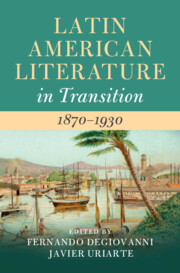Book contents
- Latin American Literature in Transition 1870–1930
- Latin American Literature in Transition
- Latin American Literature in Transition 1870–1930
- Copyright page
- Contents
- Figures
- Contributors
- Acknowledgments
- Introduction
- Part I Commodities
- Chapter 1 Rubber
- Chapter 2 Guano and Nitrates
- Chapter 3 Coffee
- Chapter 4 Plantains and Bananas
- Chapter 5 Sugar
- Chapter 6 Yerba
- Part II Networks
- Part III Uprisings
- Part IV Connectors
- Part V Cities
- Index
- References
Chapter 6 - Yerba
from Part I - Commodities
Published online by Cambridge University Press: 14 January 2023
- Latin American Literature in Transition 1870–1930
- Latin American Literature in Transition
- Latin American Literature in Transition 1870–1930
- Copyright page
- Contents
- Figures
- Contributors
- Acknowledgments
- Introduction
- Part I Commodities
- Chapter 1 Rubber
- Chapter 2 Guano and Nitrates
- Chapter 3 Coffee
- Chapter 4 Plantains and Bananas
- Chapter 5 Sugar
- Chapter 6 Yerba
- Part II Networks
- Part III Uprisings
- Part IV Connectors
- Part V Cities
- Index
- References
Summary
This chapter examines journalistic representations of the yerba mate industry created by the Hispano-Paraguayan author Rafael Barrett. It describes the long history of the yerba industry from its origins in the sixteenth century to the current vogue of nutraceutical herbal supplements before focusing on the conditions that led to massive exploitation of agricultural laborers in the debt-peonage system of the late nineteenth and early twentieth centuries. This establishes the context for a detailed examination of the politics and poetics of Barrett’s chronicles. Barrett, known today as a pioneering anarchist intellectual in the Río de la Plata region of South America, was primarily focused on exposing the human rights and labor abuses of the yerba industry, but his writings also suggest a mode of ethnobotanical inquiry at odds with the Western ontological distinction between nature and culture, a mode in which yerba itself demonstrates a startling and fascinating agency.
- Type
- Chapter
- Information
- Latin American Literature in Transition 1870–1930 , pp. 89 - 102Publisher: Cambridge University PressPrint publication year: 2022

